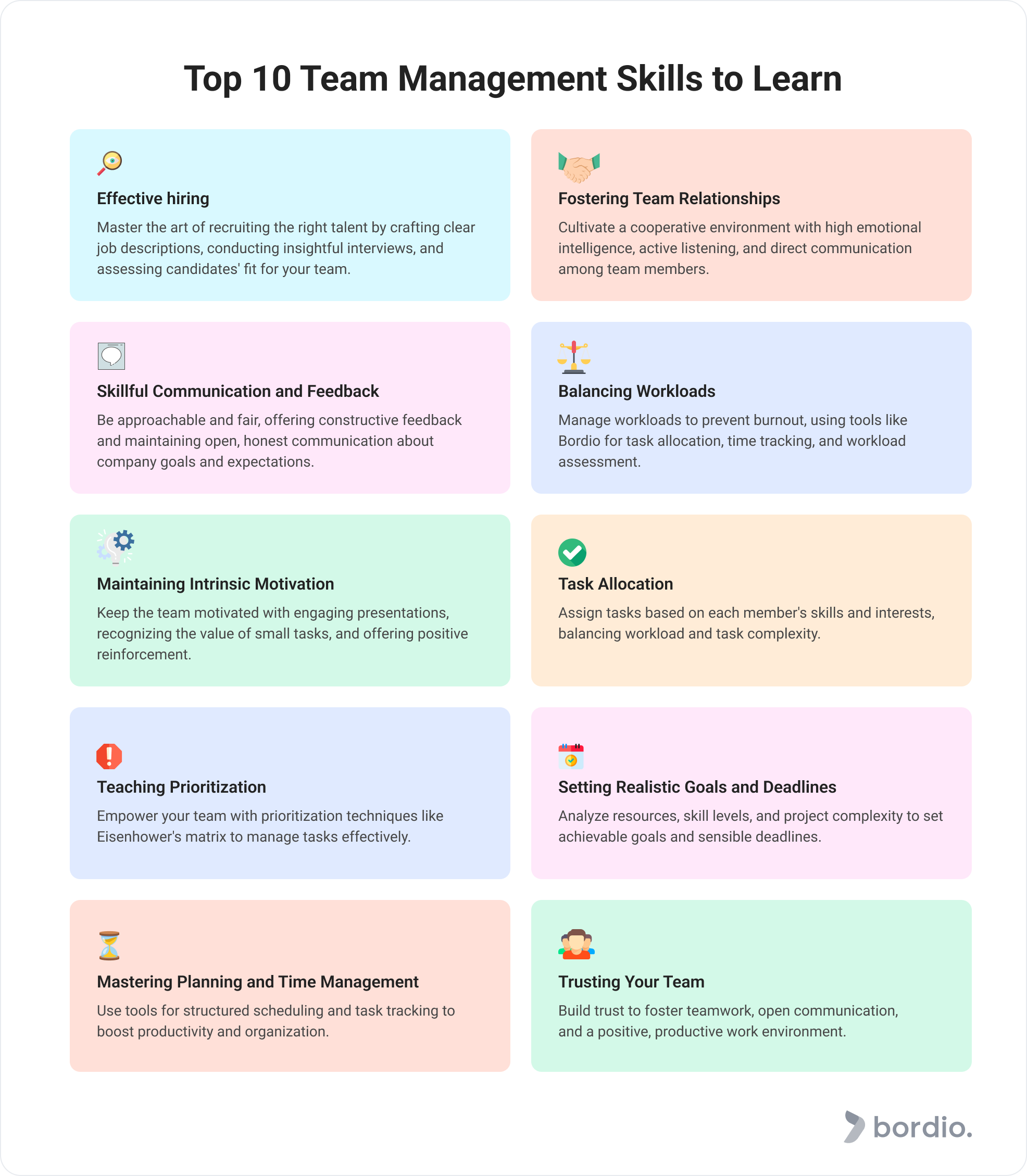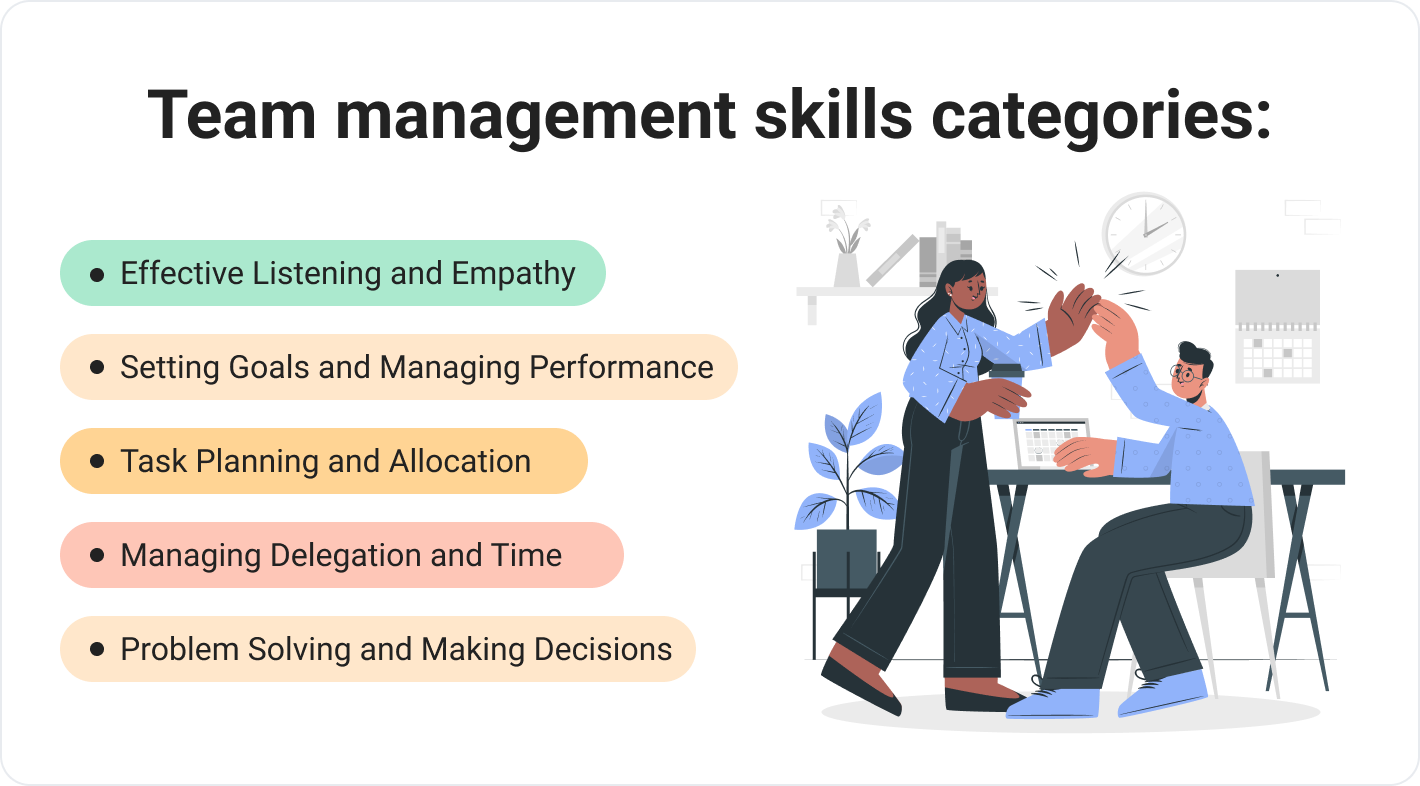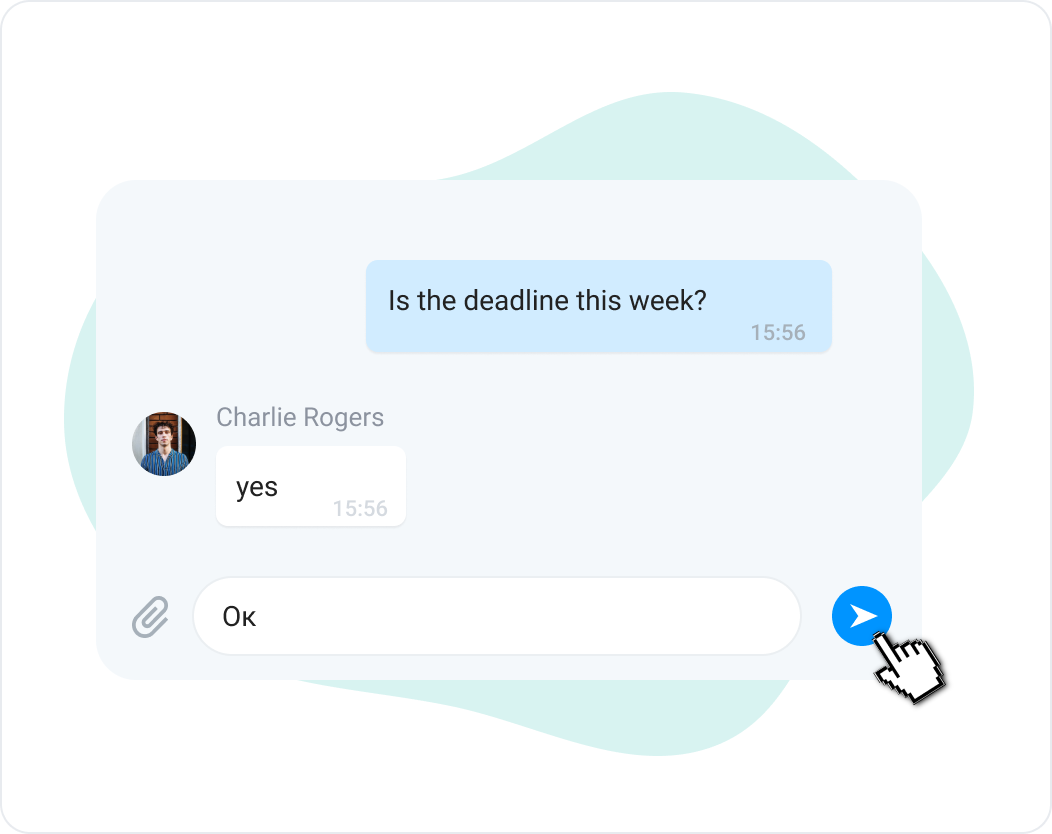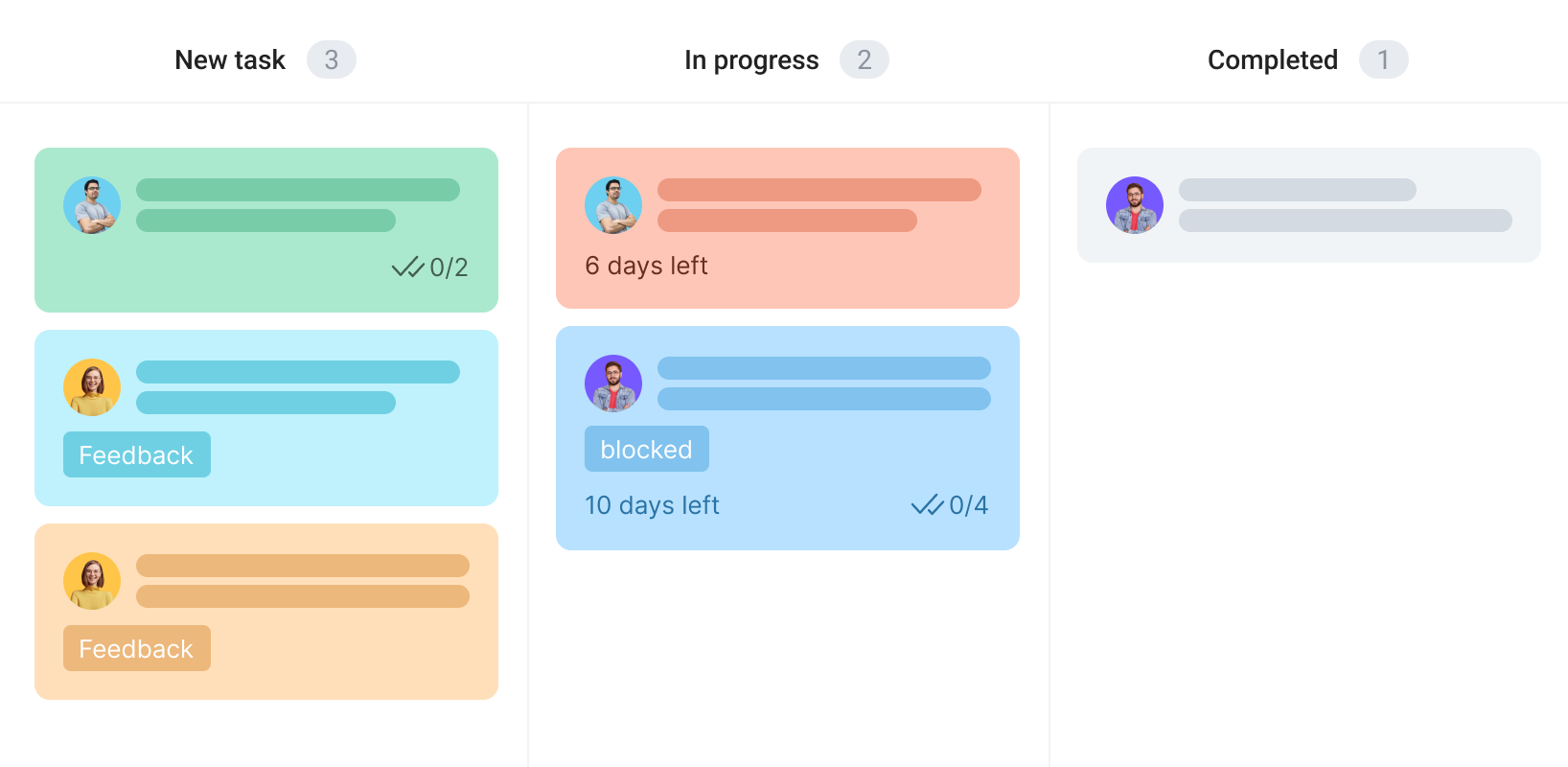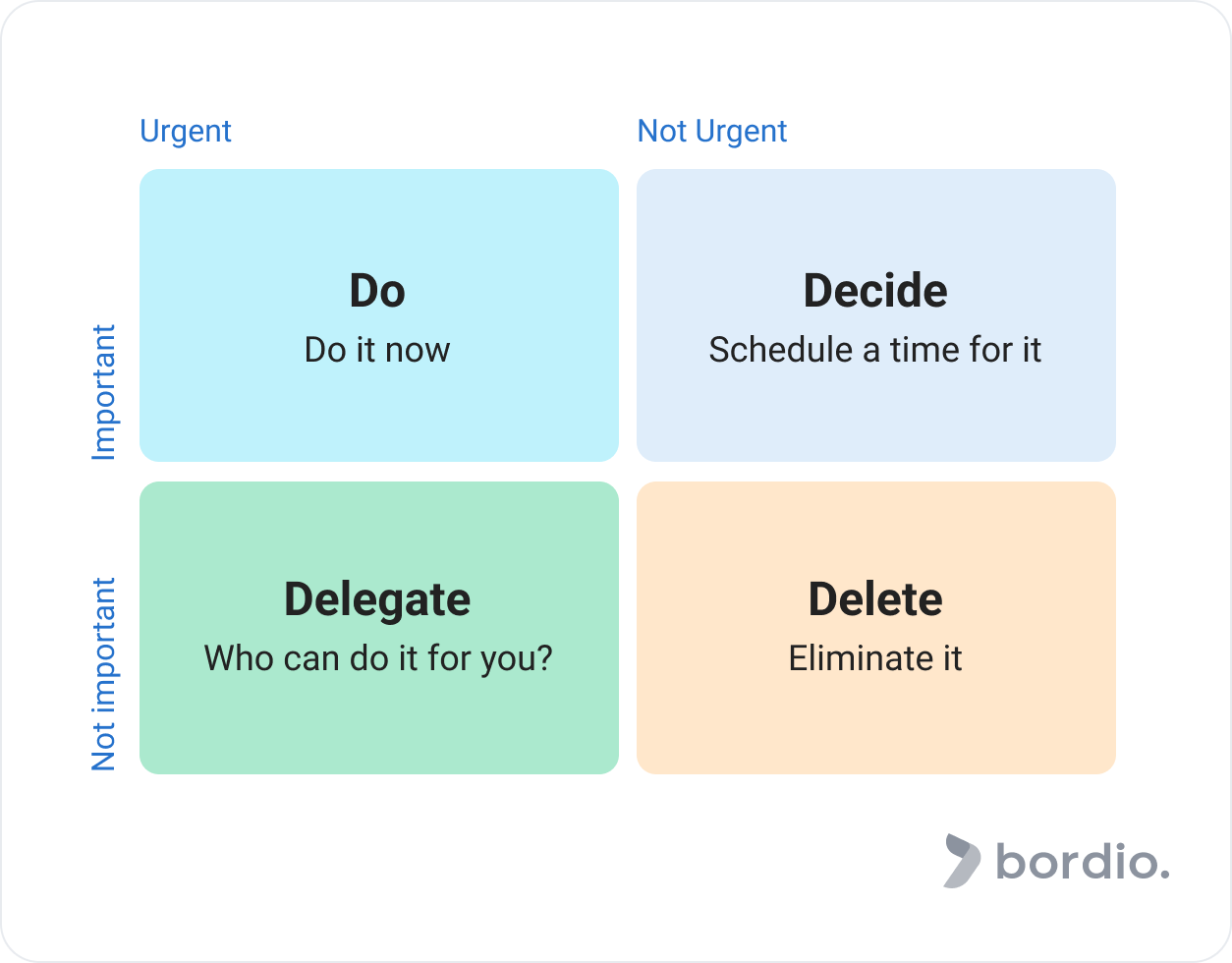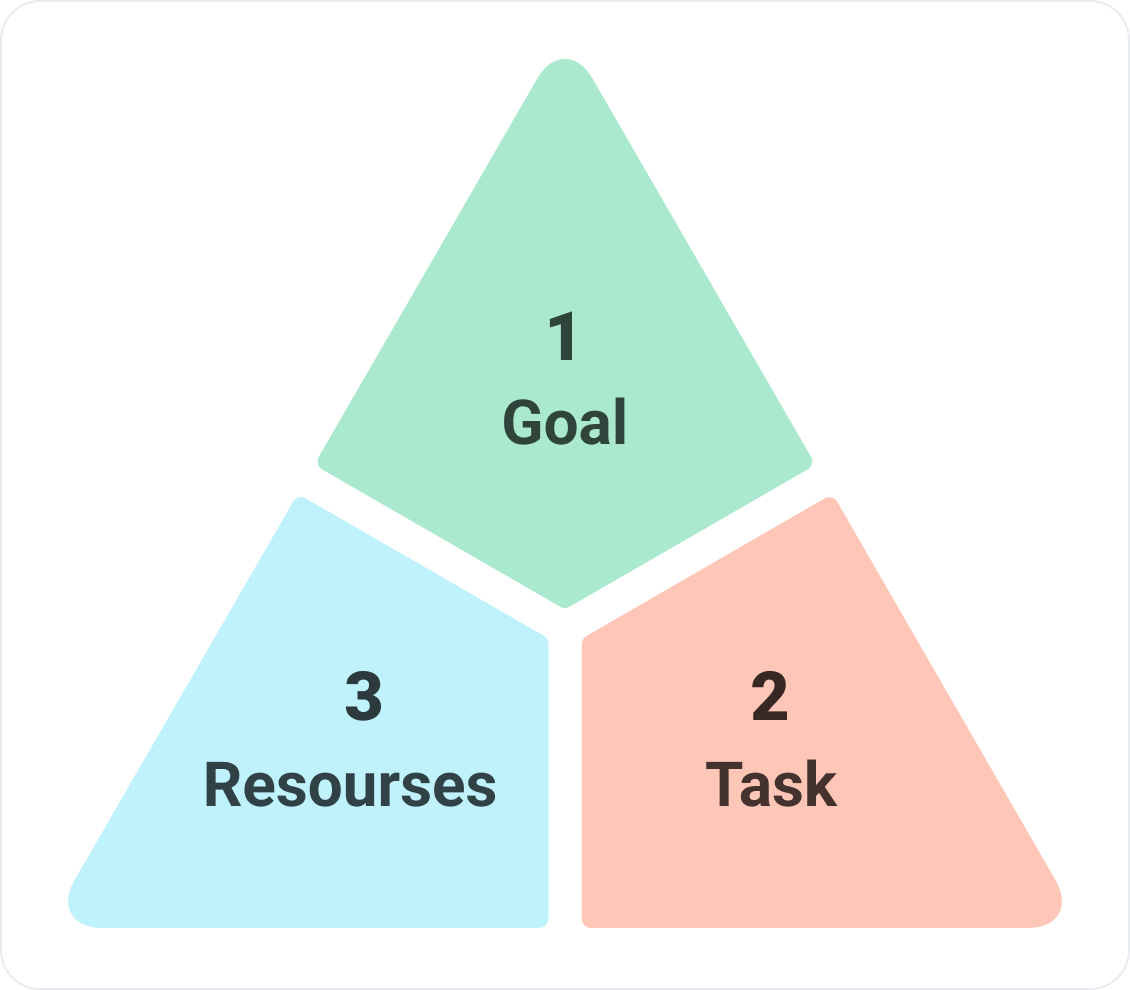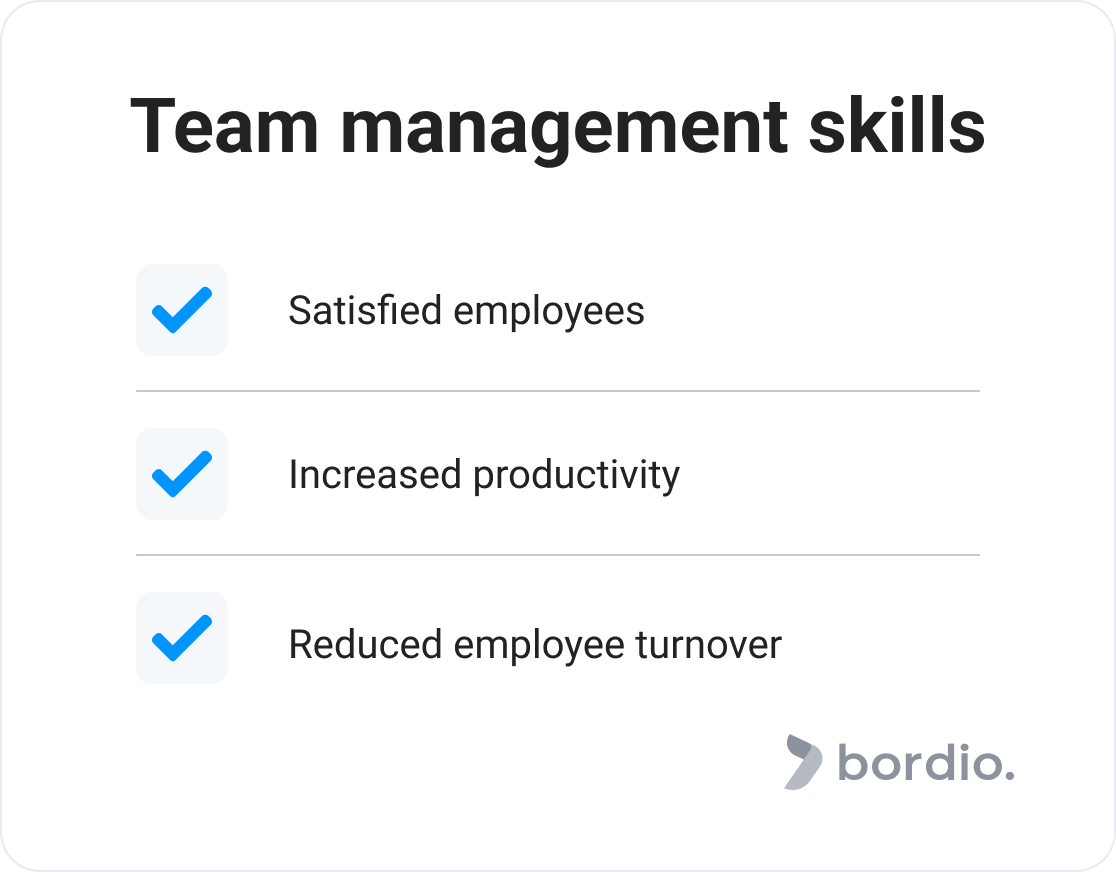A team manager plays a crucial role – they organize the team to achieve common goals. Good managers use techniques to keep each team member effective and productive. They focus on promoting collaboration and keeping everyone on track. Team management is like the engine that powers each team member’s productivity, and the team effectively manages workloads and deadlines.
More skilled managers go further and find a team management style. They clear obstacles to project development and ensure the team has the resources. A great team manager is expected to have the right skills to be effective. But what exactly do we mean by “team management skills”?
What are team management skills?
So, what do we mean by these skills? Well, it’s about understanding what makes the team work well.
Effective team performance means the team sticks together, works smoothly, and performs their best. It sets the stage for a positive workplace culture, from hiring folks to ensuring they feel heard and valued. Ensuring everyone has the right tasks, using the correct tools, and managing time is also super important. And, of course, effective teamwork needs team leaders who give helpful feedback.
In the end, we can say that a good team leader should have both hard and soft skills, and here are the main categories of skills into which we can categorize skills for simple understanding:
Listening and Emotional Intelligence: To handle team conflicts, provide feedback, and create a positive atmosphere.
Goal setting and performance management: To understand the work destination and motivate the team.
Planning and task allocation: To ensure that everyone is assigned tasks to the best of their ability and that productivity increases.
Delegation and time management: To stay on top of project deadlines and keep current with project progress.
Problem-solving skills and decision-making: To be a good leader, handle difficult situations, resolve conflicts, and make tough decisions.
Now that we’ve learned the categories let’s dive deeper into the world of productivity and team management and find out what specific skills all good team leaders should have.
Team management skills to learn: Top 10
Let’s focus on the top ten effective team management skills:
1. Hiring employees:
Finding the right employees is a big part of managing a team, and it all starts with putting together a job ad. To hire the right folks, you first need to figure out what your company needs and wants, then write up a clear job ad explaining what the job involves and what kind of skills the person should have.
After that, you’ll want to interview candidates in a way that helps you figure out if they’ve got the skills and experience you’re looking for and if they’ll be a good fit for your team. You can also check with their previous employers or coworkers to learn more about their work history.
When you’re trying someone out before hiring them permanently, it’s not just about their skills and performance – it’s also about seeing how comfortable they feel in the company. Giving them a trial run before making a final decision helps ensure they’re a good match for the organization and will reduce employee turnover.
2. Establishing good team relationships and cooperation:
As a team manager, your primary focus should be on cooperation and supporting each other. It would be best to have high emotional intelligence and active listening practice. Start by showing interest and understanding towards your team members. Build strong relationships within the team, support teamwork, and encourage team members to communicate directly with each other, not through a team manager. Regularly give feedback, help solve conflicts positively, and develop projects that everyone can work on together.
When tackling big tasks or complex projects, teamwork is critical, and effective communication plays a crucial role in getting the job done right. It’s not just about talking face-to-face in the office or giving feedback during meetings – it’s also about using collaborative tools like Bordio for team management. Bordio isn’t just about leaving little notes; it’s like having a chat room, similar to WhatsApp, where you can instantly discuss project details or give feedback.
It’s beneficial if you manage a remote team and can’t discuss everything face-to-face; communication must be straightforward and convenient. It’s not just a project management tool that helps track progress and assign tasks; it’s also a platform for addressing project issues and keeping the team informed. To start a chat, click on the task you want to discuss – whether it’s a specific project step or some other task – and in opened chat, you can ask your questions and leave messages without being distracted by work chats in other apps.
3. Team managers giving feedback and communicating with the team:
Communication skills are not only communication between team members, but also the team manager communicating with the team. Are your team members comfortable coming to you for help when things get tough? Remember that you want them to see you as a fair and honest leader, not someone to be scared of. Respect is more important than fear because fear can bring problems in the workplace.
To ensure communication with your team goes smoothly, you must be friendly – listen carefully to what your team members say and show that you’re interested in their ideas and worries. Be honest and open, sharing info about the company’s goals, changes, and what you expect from your team. And don’t forget to be patient and supportive, helping your team members grow both at work and personally.
However, don’t be afraid to point out mistakes because the cook won’t know the dish is overcooked if you don’t tell him. When pointing out mistakes, do it respectfully and stick to the facts. When giving feedback sessions, be specific about what needs to improve and how to do it. Provide constructive feedback – remember, you’re not criticizing; you’re helping. Offer suggestions for improvement, like extra training or support. After giving feedback, listen to what the person has to say. Keep the conversation open, and be ready to discuss any questions or concerns.
4. Promoting workload balance and preventing burnout:
An essential part of good teamwork is proper workload management. Ensure each team member’s work is reasonable and doable during a typical workday. Avoid overburdening people with tasks they cannot handle. Provide tools and resources to help them plan and organize their workload. Regularly assess the workload in your team and reallocate tasks if necessary to ensure employees are not overloaded.
When picking the right workload management software, remember a few things: it should let you see what tasks your team is working on, assign jobs, and make scheduling projects easier. It’d be even better if it could also track how much time is spent on tasks and help you plan out projects. Bordio fits perfectly as a practical work management tool with all these features to help you handle your workload effectively.
In Bordio, you can list to-dos, assign tasks to your team members, and add estimates for how long they’ll take, all with just a few clicks. Bordio has a parameter that shows you how much work your team has on their plate, including tasks, time blocks, and events, making it easier to manage everyone’s workload. This way, you will form a future view of the team’s workload, visible on the scheduling page. Later, you will check which tasks have been finished and how much time was spent on them – comparing what was planned with what is done.
5. Maintaining intrinsic motivation:
To motivate your team from the start, involve them in the project. An excellent tool for this is a visual presentation. For example, you include a brief overview of the client’s business, the goals and objectives of their project, and how the team will improve the situation. Make the presentation lively and engage in dialog rather than just lecturing. Remember that motivation tends to wane as projects progress, so managers and team leaders must maintain team spirit.
Emphasize the importance of small tasks, such as a small button or infographic. When team members understand how their tasks contribute to significant results, they approach their work enthusiastically.
If you work under stress, it can lead to employee burnout. They may complete one project but lose motivation for the next. To prevent this, be emotional as a leader – sense the atmosphere in the team and inject positivity when needed. An appropriate compliment on a job can restore the emotional connection between the employee and the company, giving them the inner strength to combat stress.
6. Allocate tasks appropriately:
To make sure employees get the right tasks and do them well, managers need to be good at assigning tasks. So, how do you do it right? To start with, you can create a backlog with tasks that need to be done and set a time for them. This can be done, for example, on Bordio’s waiting list. Then, with a ready-made backlog, you can mark the person performing the task in the task card. Assign by asking yourself such questions:
– What needs to be done?
– Who can do it?
– How does it need to be done?
– And who can do it right?
You know each team member’s skills, experience, and preferences. Knowing this will help you match tasks to their abilities and interests. You evaluate the requirements for each task or project. Consider how complex it is, when it’s due, and what resources are needed to finish it successfully. And finally, assign tasks based on each team member’s skills and experience. Give each task to the person best suited for it, considering their relevant experience and abilities.
7. Teach each team member task prioritization:
Not only should managers have skills, but your team should be able to function itself, and one of the skills you should teach them is prioritization. Using prioritization is much better than mindlessly doing all the tasks without thinking, and Eisenhower’s matrix is to help. To prioritize your workload effectively, your team could use a simple four-quadrant approach:
- Urgent and essential tasks should be tackled first because delaying them could have negative consequences.
- Important but not urgent tasks require attention to prevent them from becoming urgent later on and overwhelming your schedule.
- Urgent but unimportant tasks can be delegated or addressed quickly to save time for more critical matters.
- Tasks that are neither urgent nor important can often be eliminated or postponed without significant impact.
This way, employees won’t be swamped with things to do and can better handle workloads and deadlines.
8. Set achievable goals and realistic deadlines:
Before setting any deadlines, look at what you’ve got to work with. Check out your time, how much money you can spend, and who’s available on your team. Don’t aim to finish a project in record time if you’ve only got a handful of people to do it. Ensure you’ve got everything you need to complete the job on time.
Analyze the following:
– What is our goal?
– What tasks need to be accomplished to achieve it?
– Do we have the time and resources?
Then, set some deadlines that make sense based on what you’ve figured out about the task and what you’ve got to work with. Think about how hard the job is, how skilled your team is, and any problems that might come up. And hey, remember, you’re not superheroes – you’re regular people who want to get the job done best, so keep it real. Not overestimating yourself and the team is as important a skill for a team manager as being motivated and believing in yourself.
9. Planning and time management:
Mastering planning and time management skills is critical for team success. Planning is like a soup of ingredients of these skills – prioritizing, setting goals, creating a schedule of small tasks, and setting deadlines.
Creating a structured schedule is very important for effective time management. You will ensure that important tasks are completed on time by allocating a specific time slot for each task and sticking to that plan. This increases productivity and motivation. In addition, using tools such as planners, calendars, and productivity apps can help you organize tasks and manage time effectively.
To use Bordio for planning, start by creating tasks in the platform. Clearly outline the task details, including a description and deadlines. Assign tasks to team members based on their skills and availability. Bordio allows you to track real-time task progress, so encourage team members to regularly update the status of a task, indicating whether it’s in progress or completed.
Then, use Bordio’s time management feature to track how much time has to be spent on each task. Assign tasks with an estimated duration and compare them to the time spent to determine the productivity level and identify weak spots or areas that need adjustments.
10. Trust your team:
The most important thing in team management is trusting your team. Their sense of trust inspires them to manage their time wisely to meet deadlines and achieve their goals.
Trust will encourage employees’ teamwork and open communication among team members. When people feel trusted, they’re more likely to share ideas, ask for assistance when needed, and collaborate to tackle challenges. This teamwork not only boosts productivity but also improves coordination and resource management.
In summary, having trust in your team creates a positive work environment where everyone feels valued and motivated to perform at their best. This leads to better planning, time management, and project outcomes
Why are team management skills critical for effective team management?
And if we know what team management skills are, you will wonder if they are so important. And of course, we understand, so we want to tell you about the key benefits of effective team management for business and work.
Satisfied employees lead to success
Effective team management helps accomplish tasks and ensure employee satisfaction and value. When teams are well-managed and team members feel happy, companies often see an increase in market value, financial performance, and customer loyalty. Team managers can accomplish this by actively seeking and incorporating employee feedback, promoting a healthy work-life balance, and maintaining transparent communication.
Increased productivity
A well-managed team fosters a positive company culture where employees thrive. Team management plays a crucial role in shaping this culture. Team managers can improve performance by actively participating in team activities, recognizing efforts, not just accomplishments, and working with the team to identify and achieve common team goals. Thus, it can also be noted that prioritization, time management, and planning are all part of “team management skills”.
Reducing employee turnover costs
Employee losses are costly, and effective team management is crucial in reducing them. Poor relationships with managers and coworkers are among the top reasons for layoffs. Proper team management is primarily about open communication, which improves the atmosphere, reduces stress, and increases productivity. And what does this mean? Lowering the employee loss rate, of course!
Final Thoughts on Team Management Skills
Mastering team management skills is like having a multifaceted set of tools necessary to lead a team to success. The combination of proper recruitment, building strong team relationships, and balancing workloads creates an environment for productivity and innovation. Effective communication and the art of providing constructive feedback serve as the backbone for harmonious collaboration and achievement of company goals.
Ultimately, skillful team management increases employee satisfaction and leads to measurable business results, including increased productivity, reduced turnover costs, and increased organizational resilience.

